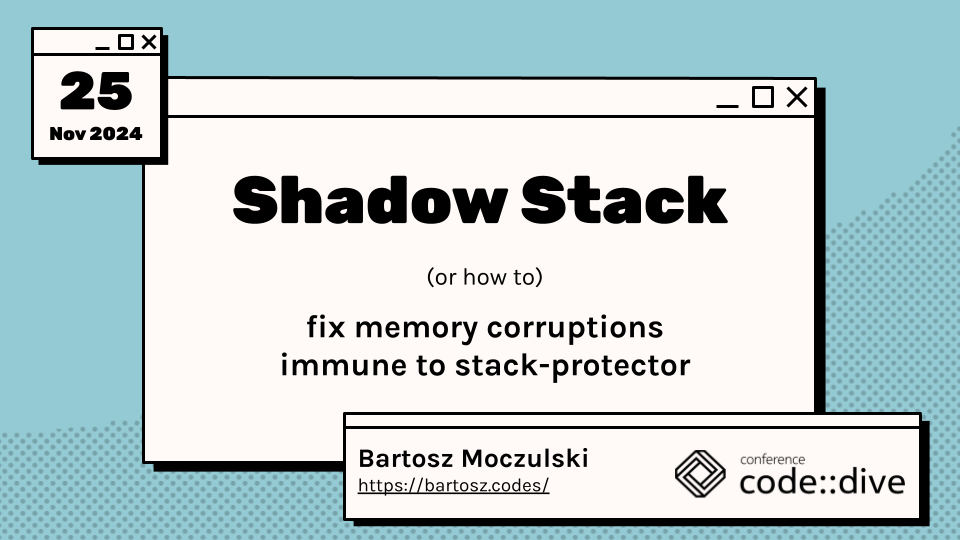A library for finding stack corruptions.
Slides from code::dive 2024 presentation are available here:
Because deep sub-sub-callee can corrupt (grand-)parent stack frame in a manner diffucult to debug and only manifesting itself way later!
Imagine the following C function:
void do_stuff(struct S *s) {
pthread_mutex_lock(&s->mutex);
do_stuff_locked(s);
pthread_mutex_unlock(&s->mutex);
}and the following call sequence:
do_stuff()
pthread_mutex_lock()
do_stuff_locked()
some()
other()
buggy_function() # <-- ERROR HERE
# here, buggy_function() corrupts stack frame of
# do_stuff_locked() which will only cause crash
# in pthread_mutex_unlock() back in do_stuff()
pthread_mutex_unlock() # <-- BOOM HERE! :(
Finding such errors with just GDB may be challenging, regardless if it is post-mortem coredump analysis of live execution.
Shadow Stack aims to help with it.
By adding interception points at pre-defined code locations and checking consistency of the entire stack above pre-call and post-return.
do_stuff()
shadow_stack_check_call()
do_stuff_locked()
shadow_stack_check_call()
some()
shadow_stack_check_call()
other()
shadow_stack_check_call()
buggy_function()
shadow_stack_check_return() # <-- error detected already HERE
shadow_stack_check_return()
shadow_stack_check_return()
shadow_stack_check_return()
pthread_mutex_unlock() # <-- no need to wait until here
There are two ways - code change of LD_PRELOAD (see examples for details).
In C function:
void do_stuff(S *s) {
// ...
do_stuff_locked(s); // don't do this
shst_invoke(do_stuff_locked, s); // do this instead
// ...
}Works with C++ too:
void do_stuff(S *s) {
// ...
do_stuff_locked(s); // don't do this
shst::invoke(do_stuff_locked, s); // do this instead
// ...
}Method calls can be a bit trickier but still supported:
void do_stuff(S *s) {
// ...
s->brew(0xC0FFEE); // don't do this
shst::invoke(&S::brew, s, 0xC0FFEE); // do this instead
// ...
}Prealoadble library can be implemented either in C and C++, whatever is more convenient.
// WARNING! Shameless ABI abuse follows, dragons ahead!
using shst_f = void* (*)(void* x0, void* x1, void* x2, void* x3, void* x4, void* x5, void* x6, void* x7);
// wrap C or `extern "C"` function like that
extern "C" void* do_stuff(void* x0, void* x1, void* x2, void* x3, void* x4, void* x5, void* x6, void* x7)
{
auto real = reinterpret_cast<shst_f>(dlsym(RTLD_NEXT, "do_stuff"));
return shst::invoke(real, x0, x1, x2, x3, x4, x5, x6, x7);
}
// works with mangled C++ names too, of course
extern "C" void* _Z3fooP1S(void* x0, void* x1, void* x2, void* x3, void* x4, void* x5, void* x6, void* x7)
{
auto real = reinterpret_cast<shst_f>(dlsym(RTLD_NEXT, "_Z3fooP1S"));
return shst::invoke(real, x0, x1, x2, x3, x4, x5, x6, x7);
}Usual CMake flow, e.g. like that:
cmake -S . -B build
make -C build
I personally prefer Ninja 🥷
cmake -S . -B build -G Ninja
ninja -C build
SHST_REACTION - what should Shadow Stack do when it detects a corruption
"ignore"- see no evil, don't report anything, continue execution"report"- print report, continue execution"abort"(default action) - print report and callabort()"heal"- print report, restore correct stack from shadow copy, continue execution"quiet-heal"- restore correct stack from shadow copy, continue execution without printing any report
SHST_DUMP_WIDTH - how wide the hex-dump should be (bytest per line)
- this should be an integer
- default is
16
SHST_DUMP_AREA - which area should be shown in hex-dump
"both"(default) - show both original stack and shadow copy"original"- show only original stack (i.e. the corrupted stack)"shadow"- show only shadow copy (i.e. the correct stack)
SHST_DUMP_HIDE_EQUAL - should equal lines in hex-dump be hidden
"yes|true|1"- hide equal lines (show only differing lines)- anything else (default) - show everything
